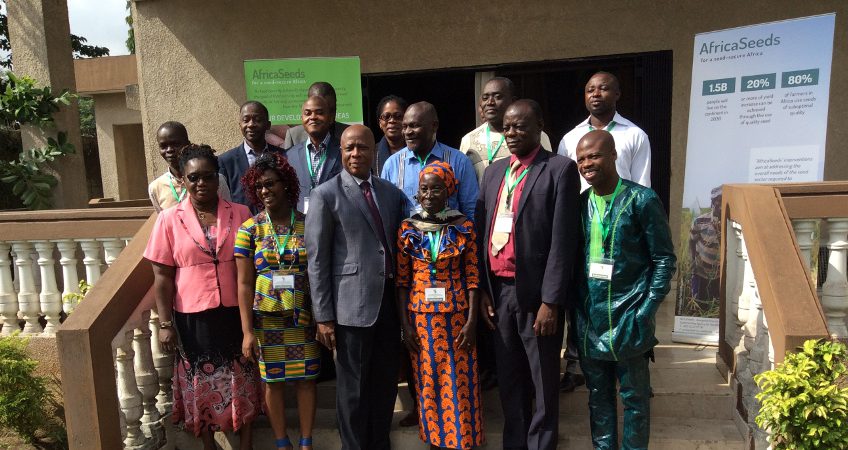Youth are nations’ greatest asset. In 2015, Africa was endowed with 226 million people aged 15-24, and numbers are expected to more than double by 2055. However, the high level of unemployment or underemployment experienced by young African is a ticking bomb for the region and beyond. Joblessness heavily affects rural areas, and young people generally have little interest in agriculture. African agriculture needs to be transformed to attract or retain young people in the sector and generate livelihood opportunities.
Women are just as key to agriculture. Accordingly to the World Bank, around 40 percent of the work force of the agricultural sector is represented by women. Some aspects of the seed value chain, such as the production and distribution of vegetable seeds for instance, are mainly handled by women, making them vital actors of seed sector development. Regrettably, they do not have the same access to resources as men, and are therefore less efficient and can seize less opportunities.
During the last few years, the seed sector has been called upon to adopt more commercial-minded business models which – according to the African Union and several other stakeholders – can help promote employment for youth and women, and agricultural transformation and growth in Africa.
Encouraging an entrepreneurial spirit among smallholder seed producers
This concern is echoed by AfricaSeeds. The pan-African institution commissioned a scoping study to establish sustainable business models for the production and distribution of seeds of various crops in Cote d’Ivoire, as well as the level of skills and education of the country’s youth. To validate the results of the study, AfricaSeeds conveyed seed sector stakeholders at a workshop in Abidjan on 21 December 2018 on “Validating Models and Protocols for the Promotion and Development of Entrepreneurship in the Seed Sector for Youth and Women in Africa, using Côte d’Ivoire as pilot country”. The workshop, in line with the AfricaSeeds’ strategy, aimed at the consolidation of the emerging small and medium scale seed enterprises which, more than the large-scale corporate models, seem to be most suited to many African countries.
20+ stakeholders from public and farmers’ organizations of Côte d’Ivoire participated to share their experience and discuss how to develop small-scale enterprises that are sustainable, innovative and adaptable, with a special focus on youth employability in the sector.
According to AfricaSeeds’ Executive Director, Dr Kouame Miezan, the expansion of small-scale seed enterprises holds the key to reinforce Africa’s seed sector and will allow to address the barriers that are impeding farmers’ access to high quality seeds.
“We must work to support small-scale seed business development adapted to the diversity of Africa’s rural areas, as this will have a ripple effect on agricultural efficiency and productivity”, said Dr Miezan. “The African seed sector should be more market-oriented, as this would serve as a powerful incentive for the development of effective and sustainable seed systems in Africa”, he continued.
For too long, food farming in Africa has been viewed as a means of earning a living with no prospect beyond subsistence. On the contrary, AfricaSeeds – together with other stakeholders – supports the idea that the seed sector can generate substantial social change and growth.
Looking at sustainability
AfricaSeeds envisions a seed sector development that is above all sustainable. During the workshop, three different business models were presented that are considered sustainable in the Ivoirian context. One model is centered on the production of vegetative material in a very organized seed value chain where needs and markets are well known; the cacao value chain, for instance, is well structured in Côte d’Ivoire. The second is based on the combination of seed production with the seed distribution to farmers: the rice value chain is a good example. The third focuses on seed distribution, with seeds coming from outside – from Burkina Faso, for instance – coupled with a mechanism to pomote the use of seeds by farmers through agricultural extension.
Following in-depth exchanges on the models, participants also expressed keen interest in the definition of training curricula that could cater for the needs of youth aiming to become agricultural entrepreneurs. Four training paths were presented and discussed.
Attendees insisted that the implementation of the models and the training paths should be multi-faceted and accommodate changing circumstances. They should also make use of innovative approaches, where relevant. Accompanying measures should include access to information, inputs, finance, markets and other support services that can enhance productivity and opportunities.
Supporting a replicable approach
The workshop focused on delivering sustainable business models for implementation in Côte d’Ivoire. The models presented take on board the plurality of seed systems, as well as crop and varietal diversity in the country.
However, this exercise is being conducted with a broader goal in mind: defining a standard approach that could be adopted in other countries in Africa, and that could help define country-specific models. In each case, existing models in country should be evaluated and consequently adapted to improve their efficiency and profitability. Most of the time, this will include a standardisation in the way the value chain operates, making sure that weak links are strengthened. In any case, the approach should be highly scalable and therefore generate significant impact along the seed value chain.
Participants and organizers agreed that, for the exercise to be successful, the next step should be a pilot phase where the validated models are applied to selected value chains, in order to learn lessons and fine-tune the approach. Importantly, it has been pointed out that financial institutions should be associated to the process in order to facilitate access to credit by young entrepreneurs, thus allowing the models to express their full potential.

